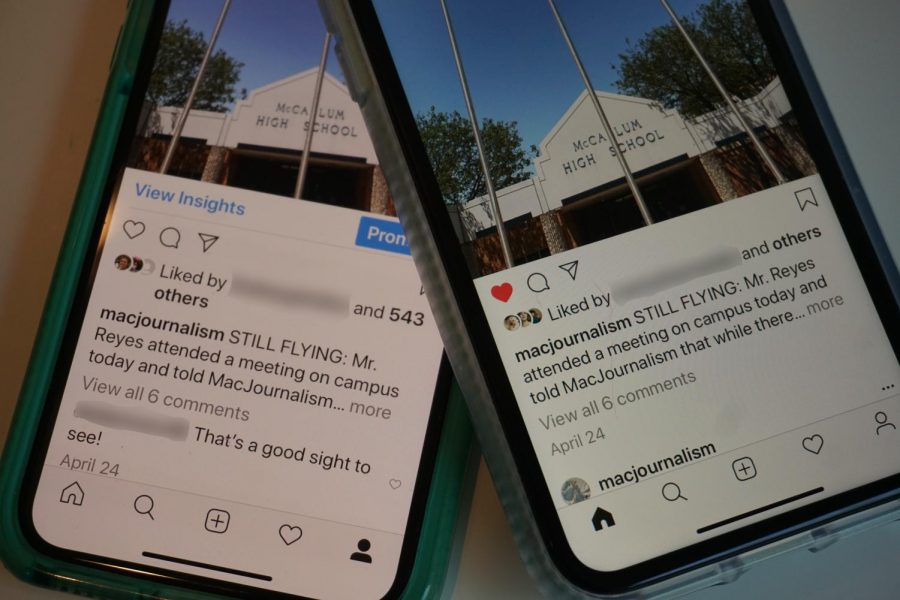Dear Instagram, likes are pointless
Because likes only exist to addict users to social media apps, it’s their time to go
Under a new and much-needed pilot initiative, Instagram is removing the number of likes on each post on your feed to encourage Instagram users to focus on the content and the people who like each post rather than the number of people who respond to it. Photo by Elisha Scott.
May 20, 2020
When I think back to the fifth grade, I can’t really remember the curriculum, the class trips or even the field days all that much. What I do vividly remember, however, was getting Instagram.
I remember my older sister convincing my mom to let me download the app on my iPad and her showing me how to use it. Looking back at it, I was really too young to have social media, and I was one of the last in my friend group to get it. I was only 11 in the fifth grade. That’s a lot of trust to put into an 11-year-old.
But I don’t blame my parents. I place the blame with the money-hungry companies that advertise popularity and “coolness” with their apps, with every follow, and every like. Kids eat it up and parents feel pressure for their kids to be 10 going on 17. That’s how we’ve found ourselves with generations of people posting a photo and staring at their lock screens, waiting for each like to roll in.
Some companies have begun damage control since realizing the error of their ways. One of the biggest changes came from a statement by Instagram announcing that the dynamic of giving likes on your peers’ posts might be very different in the future. The proposal involves taking the number value off of Instagram posts so that you can only see the number of likes on your posts.
An tweet from Instagram’s Twitter feed announcing this initiative urged the public to “focus on the photos and videos you share, not how many likes they get.”
Some users, myself included, have already seen this change take place as Instagram’s way of testing this possible new change.
Now, when I open the app, under the photo, it lists the name of one person who liked the photo followed by “…and others.” The number of likes is unknown. There is still some distinction made between mere users and influencers and celebrities. When a post gets a huge response, Instagram replaces “…and others” with “…and thousands [or millions] of others.”
For most posts by us regular people, however, it’s “and others” and that’s it. The uniform message helps to draw your attention away from the response to post and toward its actual content instead. By only showing “who” instead of “how many,” the user is able to focus on the photo and the people who liked it instead of the number: quality over quantity.
Even though I don’t post on it very often anymore, Instagram remains one of my favorite forms of social media due to its usefulness, versatility and options for privacy. Unlike some other apps, you can use it for business purposes, and it allows you to almost “collect” your memories without taking up all the storage on your phone. It’s like a virtual scrapbook.
As I’ve gotten older, however, I’ve started to see the toxic side of the app. I question why likes are even a thing in the first place. We teach the younger generation not to care what others think and to be themselves, yet we send mixed signals by spreading the message that it matters if someone likes the photos we post.
In a 2019 video titled “Dear Girls, You’re Ugly,” which streamed on Instagram, YouTube, and other social media platforms, creator Prince Ea equates Instagram to a “digital drug dealer.” He further compares a like to a hit of a drug, saying “the more you get, the more it takes to keep the feeling rushing back, so it’s no coincidence that you then double tap.”
He uses the video as a way to spread his message that social media likes should not be how we gauge popularity and that the edited and filtered photos posted by others should not be how we determine beauty and self worth. “They’re in the business of addiction.”
The comparison between drugs and social media is spot on. These apps draw you in with the hopes of getting you addicted. Why do you think other apps like Snapchat show you how many views you have? Or Twitter? Not only likes, but retweets as well.
But there is no point to all these numbers. Likes, views, and retweets don’t earn you money unless you’re a Kardashian or someone of similar “worth.” They don’t earn you points. They don’t amount to anything. They’re used as a symbol of popularity. That’s what these companies want you to think so they can suck you into their world of ‘How many likes did I get? How popular am I?’ You do nothing with them but compare how many you get to how much everyone else gets. That’s the only way they know how to draw people into their apps, to challenge their social status and tell them that this app can give it a number value.
I have a friend who still texts me every time she posts a photo to ask me to like it on every account I have access to, and when she doesn’t get enough, she deletes it. It makes me sad how she and so many other people can get so upset over a number.
I definitely can’t argue that I’m not on social media way too much or that I didn’t get it because the rest of my friends had it, but it changes as you get older.
When I was 11, it was just a fun way to share cheesy, and since regretted, memories with captions that had way too many emojis, but now it’s become a popularity contest.
When you’re a teenager in high school, your “image” seems a lot more important than when you were starting middle school. They know this, so they reel you in and convince you to download it when you’re young and naive. You probably downloaded it just for fun, but by the time you’re old enough to realize the true intentions of the app, you’re already addicted.
That’s why this change is so important to the mental health and well-being of today’s youth. This is just the first step to bringing the real value of sharing memories with your friends, family and peers back.
Because in the end, it is the app itself that’s starting the issue, but it’s the likes that are creating the addictions.





Jose Ole • Mar 25, 2023 at 4:26 pm
I never really got into the social media thing much, with my main usage being early facebook when it was more of private message boards where you could invite who you wanted. I still have it, but may only log into it once a year if I randomly need to find a photo or something. Never got into the phone app versions of these things, or phone apps in general as they seem to be lesser versions of products I already own (besides the digital camera which is the only thing the phone has fully replaced for me, but I’d still rather carry a gameboy, 3ds or psp instead of some mobile free to play bs). I do miss some of the things from social media, like seeing what a gradeschool friend is up to these days, or planning a gathering, but in general it’s not needed and the site is used more to complain about politics more than anything anyway. For the people I interact and hangout with in real life, I have their number already and can give them a call or shoot them a text without the need of a go-between service. I just don’t know what kind of value these sites could actually bring me, unless I was starting some form of online business.
John • Dec 4, 2021 at 7:09 am
I’ve always found social media to be fairly pointless in general. I’m glad I was born far before it was a thing. Each generation has its own level of stupidity. Today it’s social media. The entire “likes are cool” thing would be the smoking advertisements of my parent’s generation. “Anybody who is anybody smokes cigarettes.” That was all the rage in ads from the 50s. For my generation it was ads for alcohol or owning Jordache jeans.
Social media can have some uses. I’ll admit I’ve found it useful for making friends all over the world, whom I’ve gone to see in person when I am on vacation in their countries. Outside of that, I’ve found Twitter, Instagram and Facebook pretty useless seeing as I don’t run my own business.
One thing I have definitely noticed a lot from people ages 10 – 29 is they seem obsessed with “likes” from strangers, and often get depressed if they don’t have any. Granted I’m old and haven’t been in the “youth” category for at least 20 years, but I can’t remember a time when I needed validation from people I couldn’t care less about to feel good about myself; high school, maybe? Even by that point I was pretty much done caring about opinions of strangers.